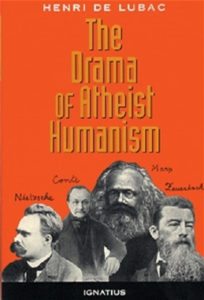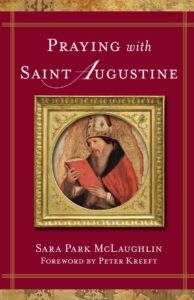“IT has been said that if one writes a word on an almond, and then replace it carefully in its husk, and sow it, all the fruit borne by that tree will be marked by the word so inscribed. For my own part, I never could approve of beginning to reform any one by merely external things,—dress, the arrangement of hair, and outward show. On the contrary, it seems to me that one should begin from within. “Turn ye to Me with all your heart;” “My son, give Me thine heart; ” for as the heart is the fount whence all our actions spring, they will be according to what it is. And the Heavenly Bridegroom, calling the soul, says, “Set Me as a seal upon thine heart, as a seal upon thine arm.” Yes verily, for whosoever has Jesus Christ in his heart will soon show it in all his external actions. Therefore, my daughter, above all things I would write that precious and Holy Name JESUS in your heart, certain that having done so, your life—like the almond tree in the fable—will bear the stamp of that Saving Name in every act; and if the Dear Lord dwells within your heart, He will live in your every action, and will be traced in every member and part of you, so that you will be able to say with S. Paul, “I live, yet not I, but Christ liveth in me.” In a word, whosoever gains the heart has won the whole man. But this heart needs to be trained in its external conduct, so that it may display not merely a true devotion, but also wisdom and discretion. To this end I would make one or two suggestions.
If you are able to fast, you will do well to observe some days beyond what are ordered by the Church, for besides the ordinary effect of fasting in raising the mind, subduing the flesh, confirming goodness, and obtaining a heavenly reward, it is also a great matter to be able to control greediness, and to keep the sensual appetites and the whole body subject to the law of the Spirit; and although we may be able to do but little, the enemy nevertheless stands more in awe of those whom he knows can fast. The early Christians selected Wednesday, Friday and Saturday as days of abstinence. Do you follow therein according as your own devotion and your director’s discretion may appoint.
I am prepared to say with S. Jerome (to the pious Leta) that I disapprove of long and immoderate fasting, especially for the young. I have learnt by experience that when the colt grows weary it turns aside, and so when young people become delicate by excessive fasting, they readily take to self-indulgence. The stag does not run with due speed either when over fat or too thin, and we are in peril of temptation both when the body is overfed or underfed; in the one case it grows indolent, in the other it sinks through depression, and if we cannot bear with it in the first case, neither can it bear with us in the last. A want of moderation in the use of fasting, discipline and austerity has made many a one useless in works of charity during the best years of his life, as happened to S. Bernard, who repented of his excessive austerity. Those who misuse the body at the outset will have to indulge it overmuch at last. Surely it were wiser to deal sensibly with it, and treat it according to the work and service required by each man’s state of life.
Fasting and labour both exhaust and subdue the body. If your work is necessary or profitable to God’s Glory, I would rather see you bear the exhaustion of work than of fasting. Such is the mind of the Church, who dispenses those who are called to work for God or their neighbor even from her prescribed fasts. One man finds it hard to fast, another finds it as hard to attend the sick, to visit prisons, to hear confessions, preach, minister to the afflicted, pray, and the like. And the last hardship is better than the other; for while it subdues the flesh equally, it brings forth better fruit. And as a general rule it is better to preserve more bodily strength than is absolutely necessary, than to damage it more than is necessary. Bodily strength can always be lowered if needful, but we cannot restore it at will. It seems to me that we ought to have in great reverence that which our Savior and Redeemer Jesus Christ said to His disciples, “Eat such things as are set before you.” To my mind there is more virtue in eating whatever is offered you just as it comes, whether you like it or not, than in always choosing what is worst; for although the latter course may seem more ascetic, the former involves greater submission of will, because by it you give up not merely your taste, but your choice; and it is no slight austerity to hold up one’s likings in one’s hand, and subject them to all manner of accidents. Furthermore, this kind of mortification makes no show, inconveniences no one, and is admirably adapted to social life. To be always discarding one dish for another, examining everything, suspicious as to everything, making a fuss over every morsel—all this to my mind is contemptible, and implies too much thought of meats and platters. To my mind there was more austerity in S. Bernard’s drinking oil by mistake for wine or water than if he had deliberately drunk wormwood, for it showed that he was not thinking of what he drank. And the real meaning of those sacred words, “Eat such things as are set before you,” lies in such an indifference to what one eats and drinks. I should make an exception of any food which is unwholesome, or likely to be injurious to the mind’s energies, such as certain hot, spiced, or stimulating dishes; as also on certain occasions when nature requires to be refreshed and invigorated in order to perform the work needful for God’s Glory. At all times a constant habitual moderation is better than occasional excessive abstinence, alternated with great indulgence. The discipline has a surprising effect in rousing the taste for devotion, if used moderately. The body is greatly subdued by the use of the hair shirt, but it is not fit for ordinary people, married persons, those who are delicate, or who have to bear considerable fatigue. On certain days of special penitence it may be used, subject to the counsel of a judicious confessor.
Every one must take so much of the night for sleep, as his constitution, and the profitable performance of his day’s work, requires. Holy Scripture continually teaches us that the morning is the best and most profitable part of the day, and so do the examples of the Saints and our natural reason. Our Lord Himself is called the Sun, rising upon the earth, and our Lady the Day-star; and so I think it is wise to go to sleep early at night in order to be ready to waken and rise early. Moreover, that is the pleasantest, the freshest, and the freest hour of the day,—the very birds stimulate us to rise and sing God’s praises. Early rising promotes both health and holiness.
Balaam saddled his ass and went to meet Balak, but his heart was not right with God, and therefore the Angel of the Lord stood in the way, with a sword in his hand to kill him, had not the ass three times turned out of the way as though she were restive; whereat Balaam smote her with his staff, until at last she fell down beneath him, and her mouth being miraculously opened, she said unto him, “What have I done unto thee that thou hast smitten me these three times?” Then Balaam’s eyes were opened, and he saw the Angel, who said to him, “Wherefore hast thou smitten thine ass? unless she had turned from me surely now I had slain thee, and saved her alive.” Then Balaam said to the Angel of the Lord, “I have sinned, for I knew not that thou stood in the way against me.” Do you see, my daughter, it was Balaam who did wrong, but he beat the poor ass, who was not to blame. It is often so with us. A woman’s husband or child is ill, and forthwith she has recourse to fasting, the discipline, and hair shirt, even as David did on a like occasion. But, dear friend, you are smiting the ass! you afflict your body, which can do nothing when God stands before you with His sword unsheathed. Rather correct your heart, which idolizes your husband, and has indulged your child, letting him give way to pride, vanity, and ambition. Or, again, a man falls often into fleshly sins, and the voice of conscience stands before him in the way, rousing him to a holy fear. Then recollecting himself, he begins to abuse his flesh for betraying him, he deals out strict fasts, severe discipline, and the like, to it, and meanwhile the poor flesh might cry out like Balaam’s ass, Why smite me? It is you yourself, O my soul, that are guilty. Wherefore do you force me into evil, using my eyes, and hands, and lips for unholy purposes, and tormenting me with evil imaginations? Do you entertain only good thoughts, and I shall feel no unholy impulses, frequent none save pious people, and I shall not be kindled with guilty fire. You cast me yourself into the flames, and bid me not to burn!you fill my eyes with smoke, and wonder that they are inflamed! But God bids you deal chiefly with your heart, for that is the chief offender. When a man suffers from the itch, there is less need to bathe him, and cleanse the surface, than to purify his blood; and so, in order to purge our vices, no doubt it is well to mortify the flesh, but above all it is necessary to purify the affections and renew the heart. Make it a rule then never to undertake any bodily austerities without the advice of your spiritual guide.”
 Dr. Lilles discusses Chapter 3 and 4 of St. Teresa of Avila’s “Way of Perfection”:
Dr. Lilles discusses Chapter 3 and 4 of St. Teresa of Avila’s “Way of Perfection”:

 Thursday of the Eighteenth Week in Ordinary Time – A Time of Lectio Divina for the Discerning Heart Podcast
Thursday of the Eighteenth Week in Ordinary Time – A Time of Lectio Divina for the Discerning Heart Podcast

 You can find the book
You can find the book 









